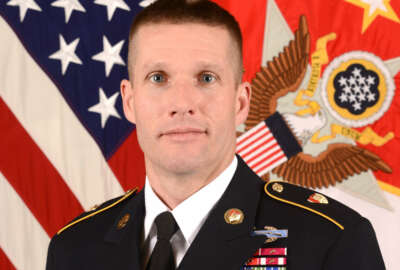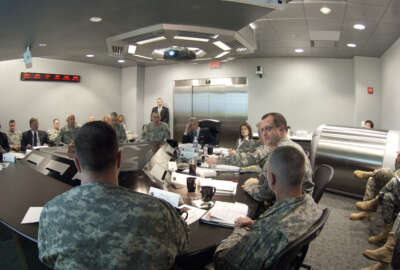
Reservists may get license transfers from military to civilian world
A pilot program is making it easier for recent veterans with military trucking licenses to transition into civilian occupations.
Best listening experience is on Chrome, Firefox or Safari. Subscribe to Federal Drive’s daily audio interviews on Apple Podcasts or PodcastOne.
It looks like the phrase “keep on truckin'” is paying off for some reservists. The Transportation Department is launching a pilot program that allows reservists and veterans to transfer their military training into the civilian world.
The new program highlights a lapse in licensure service members have been struggling with for quite some time: why can someone drive a truck in the military, but need to retrain to do the same thing once that person is out.
“This program will allow our Veterans and Reservists, to translate their extensive training into good-paying jobs operating commercial vehicles safely across the country, while also addressing the nationwide driver shortage,” said Transportation Secretary Elaine Chao in a July 3 press release.
The program is only for 18- to 20-year-old reservists who have the military equivalent of a commercial driver’s license.
The program is sponsored by Sen. Deb Fischer (R-Neb.) and Rep. Don Bacon (R-Neb.) in the Fixing America’s Surface Transportation Act.
“This innovative program offers a way for our younger Veterans and Reservists to transition to the civilian workforce. I personally thank Secretary Chao and officials with the DOT who continue to find ways to utilize the training and talent of the men and women who served in uniform for our country,” Bacon said.
The program will run for three years and only accounts for 200 drivers hired by 70 carriers. The drivers in the program will have their safety records compared to a control group to see if there is any difference. The control drivers will be 21- to 24-year-old drivers with their commercial driver’s license.
The program was opened up for public comment organizations like the Colorado Department of Revenue, the American Association of Motor Vehicle Administrators, the National Propane Gas Association, the National Limousine Association and the American Trucking Associations all supported the pilot program.
Concerns about the pilot program involved worries that drivers 18 to 20 are more likely to crash.
The program could lead to an institutionalized initiative to help ease reservists and veterans into the civilian workforce, which is something lawmakers have had their eye on for some time.
An exchange between Sen. Elizabeth Warren (D-Mass.) and Army Sgt. Maj. Daniel Daily in 2017 during a Senate Armed Services Subcommittee on Personnel hearing sums up some lawmakers’ frustration with the training transfer barriers.
WARREN: Sgt. Maj. Dailey, the Army trains thousands of soldiers every year to drive trucks in the most difficult conditions — in combat, with hazardous cargo at night, in sandstorms, you name it. If it’s tough, you train people to do it.
So would you say those folks are pretty good truck drivers?
DAILEY: I would say my opinion they’re the best in the world, ma’am.
WARREN: Best truck drivers in the world, that sounds like an expert opinion on that.
So with those kinds of skills, when they transition from the Army, it is reasonable to assume that they could pretty much sign on with any long haul trucking company and hit the interstate the next day, right?
DAILEY: That is correct, ma’am.
WARREN: And they can?
DAILEY: Not fully, ma’am, no.
WARREN: No, they can’t. How come?
DAILEY: Ma’am, it’s a complicated matter. First and foremost, one, we have to credential them — those young men and women. Two is we have to work. The requirements for each and every one of the 54 states and territories that license those trucks, ma’am.
WARREN: Yeah. So we’ve got a state and national licensing problem here, and we can’t take the world’s best truck drivers and just automatically move them into truck driving jobs, right, civilian truck driving jobs.
Read more of the DoD Personnel Notebook.
Copyright © 2025 Federal News Network. All rights reserved. This website is not intended for users located within the European Economic Area.
Scott Maucione is a defense reporter for Federal News Network and reports on human capital, workforce and the Defense Department at-large.
Follow @smaucioneWFED
Related Stories





